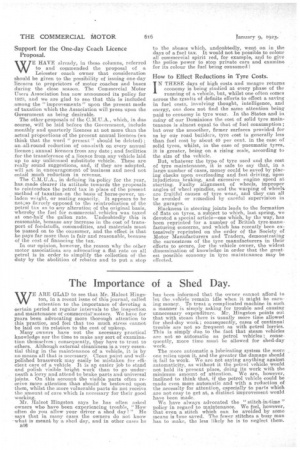The Importance of a Shed Day.
Page 2

If you've noticed an error in this article please click here to report it so we can fix it.
E ARE GLAD to see that Mr. Halcot Hings
ton, in a recent issue of this journal, called • attention to the importance of 'devoting a certain period at regular intervals to the inspection and maintenance of commercial-motors. We have for years been advocating more thorough attention to this practice, and feel that too much stress cannot be laid on its relation to the cost of upkeep.
Many owners have not the necessary practical knowledge nor the time to make any sort of examination themselves ; consequently, they have to trust to others. Although external cleanliness is a very essential thing in the maintenance of a vehicle, it is by no means all that is necessary. Clean paint and wellpolished brasswork may easily be mistaken for efficient care of a vehicle It is an easier job to stand end polish visible bright workthan to go underneath a lorry and attend to brake parts and universal joints. On this account the visible parts often receive more attention than should be bestowed upon them, whilst the more vulnerable parts do not receive the amount of case which is necessary for their goad working.
Mr. iIalcot Hingston says he has often asked
owners who have been experiencing trouble, "How
often do you allow your driver a shed day?" He says that in many cases the owners do not know what is meant by a shed day, and in other cases he
has been informed that the owner cannot afford to let the vehicle remain idle when it might be earning money. To treat a complicated machine in such a manner is simply asking for trouble and causing unnecessary expenditure. Mr. Hingston points out that with steam there is usually more time allowed for shed-day work; consequently, cases of continual trouble are not so frequent as with petrol lorries. This is simply dile to the fact that steam vehicles are not so automatic as petrol vehicles ; consequently, more time must be allowed for shed-day work.
The more automatic a lubricating system the more one reiies upon it, and the greater the damage should it fail to work. We are not saying anything against automaticity, as without it the petrol vehicle would not hold its present place, doing its work with the minimum amount of attention. We aa-e, however, inclined to think that, if the petrol vehicle could be made even more automatic and with a reduction of the necessity for attention especially to parts which are not easy to get at, a distinct improvement would have been made. We have always advocated the " stitch-in-time " policy in regard to maintenance. We feel, however, that even a stitch which can he avoided by some means is time saved. The fewer stitches a busy man has to make, the less likely he is to neglect them.
































